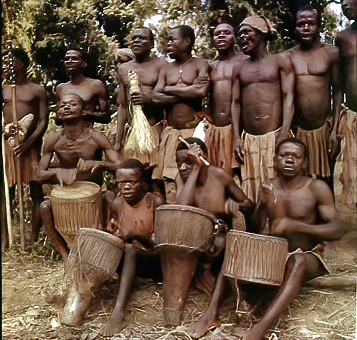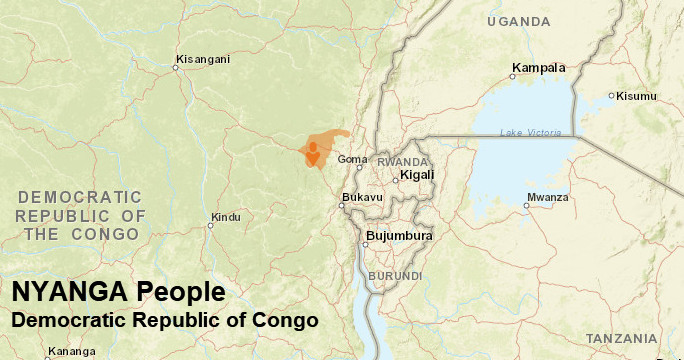

The Nyanga are a subgroup of the Kivu peoples of Democratic Republic of Congo.
Not to be confused with Nyanga (or Manianga, Manyanga) tribe (Kongo subgroup).
Today they live predominantly in the Kivu region of the Democratic Republic of the Congo, near the frontier with Rwanda and Uganda. Their homeland is a mountainous rain forest.

The Nyanga economy revolves around hunting, trapping, and food gathering, as well as banana growing. They farm and raise cattle for milk and meat.
The Nyanga of Congo (Kinshasa) are numbering 375,000 (Peoplegroups.org, 2024)
Their national epic is the karisi Mwindo.
Historically farmers, they supplemented their diet through hunting. The Nyanga are organized into chiefdoms and possess a number of initiation societies. Their mythology is often expressed in the form of heroic songs called Karisi. The foundation of Nyanga myth lies with the Twa Pygmies of Kivu. It is acknowledged that their heroic poetry tradition came from the local Twa. Many of the deities or “Bashumbu” worshipped by not only the Nyanga but related ethnic groups such as the Hunde, Kumbure, Tembo, and Shi are of Twa origin.
The jungle was the world of the Nyanga and the village existed at the center of that world. The rainforest was a benevolent being to the Twa, but for the Bantu it was a hostile place full of malevolent beings. At the same time the jungle was seen as a place where the Nyanga could find privacy and fulfillment. Nyanga country is mountainous rainforest crisscrossed with many rivers. Villages were usually located on hilltops to further demarcate the bush-village dichotomy. People climbed the hill to one guarded entrance and descended from the single exit in order to leave.
The Twa pygmies were highly regarded by the Nyanga for their hunting skill, generosity, musical talent, and extensive knowledge of divination. As such they were afforded many privileges over other people. The Twa had many ritual responsibilities and as the original owners of the land legitimized Nyanga chiefs. As a result of their joking relationship (a phenomenon found across much of sub-saharan Africa) the Twa freely referred to all Nyanga save the chief as “Barimi” or ignorant. Since Nyanga chiefs were forbidden to hunt, the Twa were expected to hunt in his stead. In return the chiefs were expected to lavish the Twa with gifts and recognition.
Sources: